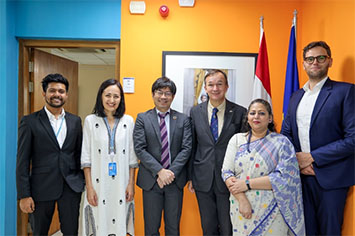
DHAKA, 24 November 2024 – The Embassy of the Kingdom of the Netherlands and UNFPA Bangladesh signed an agreement on Sunday (Nov 24) to expand Shombhabona (meaning "Potential"), the social norms shift accelerator programme of UNFPA to end child marriage in Bangladesh.
The Netherlands Government has committed USD 1.2 million to UNFPA to support a transformative programme benefiting over 100,000 individuals, including women, men, girls, and boys, and 500 educational institutions in targeted districts.
This funding seeks to empower marginalized adolescent girls, enabling them to live healthier, safer lives and make informed decisions about their education, livelihoods, relationships, and reproductive health, according to a joint statement issued by the UNFPA and the Netherlands embassy here.
With funding support from the Netherlands, Shombhabona will extend its evidence-based interventions to Jamalpur and Gaibandha, two districts with alarmingly high child marriage rates.
This expansion builds on the existing support from the Netherlands Ministry of Foreign Affairs to the GPECM, leveraging its conceptual framework to challenge and transform harmful gender and social norms that perpetuate child marriage.
"The norms that Shombhabona aims to transform not only underpin child marriage but also contribute to pervasive gender inequality in Bangladesh," stated Masaki Watabe, Representative of UNFPA Bangladesh, reiterating UNFPA's commitment to evidence-based and contextualized programming that factors in the lived realities of women and girls.
Andre Carstens, Head of Mission at the Dutch Embassy, reaffirmed the Netherlands' commitment to supporting Bangladesh in reaching the Sustainable Development Goal (SDG) target of ending child marriage by 2030.
"Ending child marriage requires a concerted effort," he emphasized. "Through our Global Programme and Shombhabona, we will address the root causes and drive meaningful, transformative societal change."
UNFPA’s Shombhabona programme employs a multisectoral approach to tackle this pervasive issue. It integrates interventions into existing education, health, and social welfare initiatives while enhancing the capacity of government coordination mechanisms.
By adding these two districts to the existing areas of Bagerhat and Chapainawabganj, the programme will now operate in four districts, reaching a greater number of adolescent girls, their families, and communities across Bangladesh.
Child marriage remains a persistent challenge in Bangladesh, with nearly 50% of women aged 20–24 married before the age of 18—a rate that has stagnated since 2012.
While early progress saw a decline from 64.2% in 2006 to 52.3% in 2012, the subsequent years have witnessed only a marginal decrease. Contributing factors include entrenched gender and social norms, the impact of climate change, migration, and lackluster implementation of laws and policies.
Launched in 2016, the UNFPA-UNICEF Global Programme to End Child Marriage is the largest global initiative addressing child marriage. Supported by governments and organizations worldwide, including the Netherlands, the programme demonstrates the power of collective action in driving transformative change for girls.